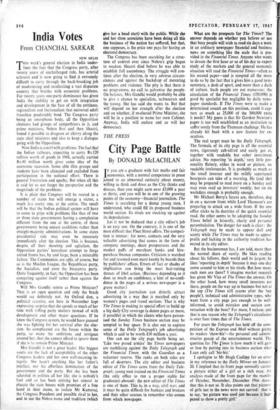India Votes
From CHANCHAL SARKAR
NEW DELHI
THIS week's general election in India under- lines the fact that the Congress party, after twenty years of unchallenged rule, has arterial sclerosis and is now going to find it extremely difficult to carry through the back-breaking job of modernising and secularising a vast disparate country that bristles with economic problems. For twenty years one-party dominance has given India the stability to get on with integration and development in the face of all the pettiness, regionalism and factionalism that universal adult franchise predictably bred. The Congress party being an amorphous body, all the Opposition elements had groups of sympathisers in it, and prime ministers, Nehru first and then Shastri, found it possible to dragoon or chivvy along the state chief ministers and also to keep a dialogue going with the Opposition.
Now India is aswirl with problems. The fact that the Indian railways, expecting to carry Rs.120 million worth of goods in 1966, actually carried Rs.40 million worth gives some idea of the economic recession. Some able elite groups and students have been alienated and excluded from participation in the national effort. There is general frustration and apathy. But when all this is said let us not forget the perspective and the magnitude of the problems.
It is plain that Congress will be routed in a number of states but will emerge a victor, a much less cocky one, at the centre. The result will be that the Indian political system will have to come to grips with problems like that of two or three state governments having a complexion different from the one at the centre, of those governments being uneasy coalitions rather than straight-majority administrations. In some states presidential rule may even be necessary immediately after the election. This is because, despite all their shouting and agitation, the Opposition parties' herculean attempt to forge united fronts has, by and large, been a miserable failure. The Communists are split, of course, but so is the Muslim League, the Republican party, the Socialists, and even the Swatantra party. Quite frequently, in fact, the Opposition has been competing against itself rather than against the Congress.
Will Mrs Gandhi return as Prime Minister? That is an open question and only the brash would say definitely not. An Oxford don, a political scientist, out here in November kept expressing surprise that she spends so much of her time with trifling party matters instead of with development and other major questions. If he knew the Congress system, he would have guessed she was fighting for her survival after the elec- tion. So .complicated are the forces within the party, so many the ambitions and intrigues around her, that she cannot afford to ignore them if she is to remain Prime Minister.
Mrs Gandhi is not a great leader. Her biggest assets are the lack of acceptability of the other. Congress leaders and her own well-meaning in- tegrity. She hasn't anything like her father's intellect, nor his effortless domination of the government and the party. But she has been schooled in politics all her life; she is nobody's fool and so has been striving her utmost to placate the state bosses with promises of a free hand in their states, to isolate Mr Kamaraj, the Congress President and possible rival to her, and to use the Nehru name and tradition (which give her a head start) with the public. While she and her close associates have been doing all this the business of the nation has suffered, but that, one supposes, is the price one pays for having an electoral democracy.
The Congress has been searching for a struc- ture of control ever since Nehru's grip began to weaken. Shastri died before he was able to establish full ascendancy. The struggle will con- tinue after the election, in very adverse circum- stances and against the backdrop of mounting problems and violence. The pity is that there is no programme, no call to galvanise the people. On balance, Mrs Gandhi would probably be able to give a chance to specialists, technocrats and the young. She has said she wants to. But that will depend on her strength after the election and on whether, if re-elected Prime Minister, she will be in a position to name her own Cabinet. Anyway, India will endure and so will her democracy.





























 Previous page
Previous page